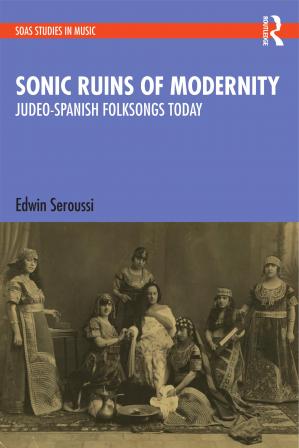Bienvenida Aguado-Mushabak (Chanakale)
6. Coplas de Hanukkah: Dak Il Tas, Toma El Tas
This text is only a fragment of a very old Judeo-Spanish song about the social activities related to the celebration of the holiday of Hanukkah, which has miraculously been preserved in the oral tradition. The recorded versions preserve the poetic form of the original song, four-line stanzas with a return to the word Hanukkah at the end of each one that announces the refrain, only in the first stanza. In the rest of the stanzas the refrain is repeated to compensate for the lack of a verse.
The refrain of the original song that we reproduce below based on the manuscript of the National Library of Israel, Yehuda Collection 205 (fol. 63b) reads: “Merquedes mis haverim candelas de Janucá”

The precept of lighting the candles of the candelabra during the eight days of the holiday appears in this old song at the end of the first stanza, in Hebrew: lehadlik ner shel Hanukkah (“light a Hanukkah candle”). This verse has become the refrain of the oral version, which has lost the original refrain. This Judeo-Spanish song dates back perhaps to the seventeenth century, as the Ottoman Hebrew poet Avtalyion composed a Hanukkah piyyut based on its format and melody with the following heading: “Lahan [Melody of] Merquedes mis haverim, semai [Turkish musical genre] (Strasbourg, National and University Library, Ms. 3967, fol. 58).
The sung text, as well as the old manuscript text, mention the bustle that characterizes the holiday, the drinks and delicacies that are cooked for the occasion: chicken and roast meat (Turkish: tandur) and a musical instrument (santur) that accompanies the evenings. The old poem, on the other hand, contains instead of the santur, tanbur, the most important musical instrument of classical Ottoman music, a selection that is somewhat more in tune with the musical space inhabited by the Ottoman Sephardim. The girls from the first stanza of the oral version are also not mentioned in any of the eight stanzas of the manuscript version that have survived. This is another testimony to the continued creativity of Sephardic lyrical poetry in the oral tradition.
Text
Dak il tas, toma 'l tas,
las muchachas meten bas
en Shabbat de Janucá.
Ocho días de Janucá,
lehadlik ner shel Janucá.La gallina de la cucina,
dálde a gostar a la vicina,
que le seya milicina.
Ocho días...Mete la carne al tandur,
tañeremos un buen santur
en Shabbat de Janucá.
Ocho días...El vino de la serada
que a mí muncho m’agrada
a beber en Janucá.
Ocho días…






